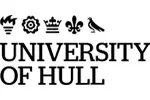

the United Kingdom
University of Hull| The award | How you will study | Study duration | Course start | Domestic course fees | International course fees |
|---|---|---|---|---|---|
| PhD | find out | find out | find out | find out | find out |
Mathematics at Hull offers opportunities to study towards a Doctor of Philosophy (PhD) in a thriving research environment. We welcome research proposals in any of our specialisms. Our staff have a wide range of expertise in many different areas, from pure maths theories around low-dimensional topology and asymptotic geometric analysis, to fluid dynamics, superstring theory and astrophysics across other disciplines.
While studying towards a PhD at Hull, you'll be fully supported by two supervisors who are able to offer expert supervision in your area. You'll also benefit from being part of a genuine community of mathematicians.
Apply for a research programme in Mathematics
Our key research interests can be broadly themed into the following:
Asymptotic geometric analysis
Asymptotic Geometric Analysis studies the geometric and linear properties of finite dimensional objects, normed spaces, and convex bodies and the asymptotics of their various quantitative parameters as the dimension tends to infinity.
At Hull, our main interests are the local structure of the classical Lp spaces, in particular the finite-dimensional normed subspaces with a symmetric basis, the geometry of random polytopes in isotropic convex bodies, and the singular values of random matrices, especially when the random entries are not identically distributed.
Environmental and Industrial Modelling
Environmental mathematical models have been developed to analyse river flows in estuaries and the impact on the growth of vegetation due to pollutants released further upstream. Work has also been done into the feasibility of underground repositories for storing materials with low and medium levels of radioactivity.
Additional interests are in numerical methods for solving large systems of linear algebraic equations underlying environmental models and investigating genetic algorithms for optimisation purposes.
Fluid Dynamics
Within the area of fluid mechanics, the main focus is on a combination of asymptotic analysis and numerical methods for the study of high Reynolds number viscous flows.
Staff: Dr John W Elliott
Processes on complex networks
Large complex networks can be found everywhere, for example as social, information, technological and biological networks. Many of these networks share the property that they are scale free, i.e., the number of links of nodes have a power law distribution. Hubs with a very high number of links play an important role in the behaviour of the network.
Processes on these networks one can think of are opinion formation in social networks, the spread of information via telecommunication and computer networks, and epidemics in society. In Hull, we use probability theory to investigate what the effect is of the scale-free nature of complex networks on processes on these networks, both in and out of equilibrium.
Potential projects include investigating:
Foundations of Statistics
We study the mathematical modelling and management of uncertainty, in which a central role is played by probability distributions. Questions of interest include: what and how can we learn from statistical data? How can we combine different sources of uncertain information? And how can we use such information in order to make optimal decisions in situations involving uncertainty?
Potential projects include:
Staff: tbc
Statistics in Astrophysics
What is the mass of the most massive object in the Universe? What is the size of the biggest cosmic void we are most likely to observe? What is the magnitude of the most energetic solar flare that could occur?
We address these questions by studying the likelihood of rare, extreme events with extreme-value statistics, which has long been used in meteorology and engineering, and has recently found many applications in astrophysics.
Potential projects include:
Staff: tbc
You should normally have, or expect to obtain, at least 2:1 Honours degree (or international equivalent) in mathematics or a related discipline appropriate to your intended research.
Please contact your prospective supervisor in the first instance. Once a member of staff has agreed to supervise your research project in principle, please make a formal application.
Contact University of Hull to find course entry requirements.
Below are some suggested courses at other providers that you may also be interested in:
Professional Certificate of Competency of Data Engineering Foundations Professional Certificate
Engineering Institute of Technology
Find out moreBachelor of Business Administration BBA
University of Applied Sciences Europe - Amsterdam
Find out moreIf you do not meet the entry requirements for this course then consider one of these postgraduate preparation courses from another institution:
Graduate Diploma of Engineering (Industrial Automation)
Engineering Institute of Technology
Find out moreGraduate Diploma in Applied Science (Medical Physics)
Queensland University of Technology (QUT)
Find out moreThere are 133 other courses listed from University of Hull. A selection of these are displayed below:
Find out more about studying in the United Kingdom